The Debt Collection Lab produces original research papers and briefs studying the impact ofdebt collection lawsuits on consumers and the courts.
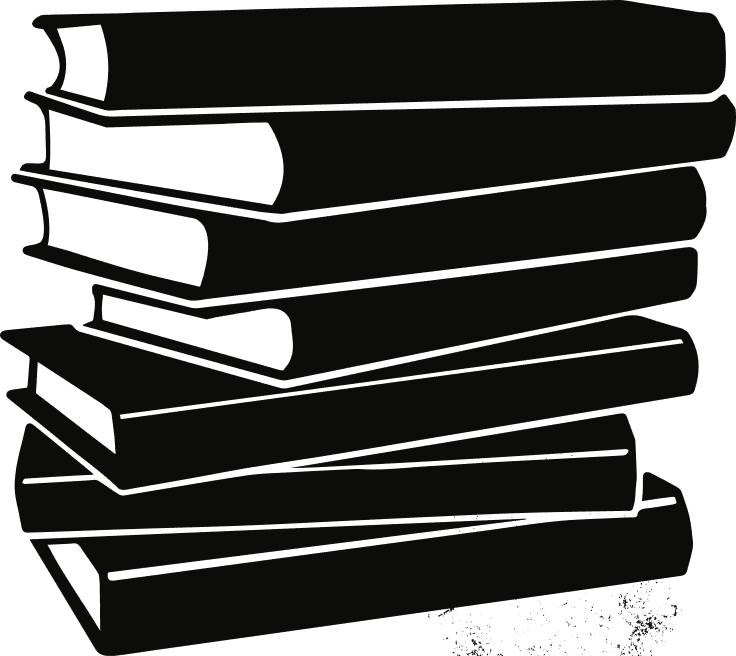
Research
Debt Collection Lab researchers are an interdisciplinary team of scholars studying debt, debt collection, and courts. Our work explores court processes and evaluates state reforms to help level the legal playing field for unrepresented consumer borrowers and tells the stories of individuals and communities impacted by consumer debt.
Filter results

Frederick F. Wherry and Hannah Hill • October 8, 2024
How State Policies Affect Court Judgments in Debt Collection Lawsuits: a Comparative Study Across Four States
When defendants engage with civil courts about debt collection lawsuits across the United States, they encounter courts that are governed by different policy environments. Drawing on quantitative and qualitative evidence, this study uses a comparative design to investigate whether a debtor sued in a policy environment with fewer consumer protections is more likely to receive a default judgment as a case outcome than those sued in a policy environment with more consumer protections.
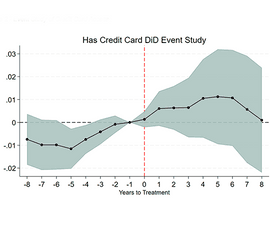
Abhay Aneja, Luis Faundez, Dalié Jiménez, Claire Johnson Raba, Prasad Krishnamurthy, and Manisha Padi • September 10, 2024
Debt Documentation Requirements in State Courts and Access to Credit
In this fourth paper on the effect of debt documentation requirements, the authors estimate the effect of these laws on credit access using a difference-in-differences approach. They designatestates that passed documentation reforms as treated states and those that did not as controls. They then compare the difference in credit access between treated and control states before and after the documentation reforms. They find no evidence that enhanced debt documentation requirements lead to lower credit access. In particular, they find no statistical evidence of a decline in the number of open credit cards, credit card access, or total credit card debt after the passage of enhanced documentation requirements.
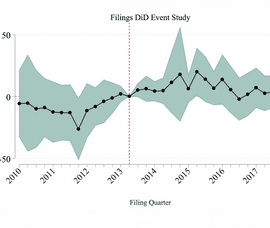
Abhay Aneja, Julia Byeon, Luis Faundez, Doug A. Lewis, Dalié Jiménez, Claire Johnson Raba, Prasad Krishnamur, and Manisha Padi • September 6, 2024
More Paper in Texas: An Evaluation of Documentation Reforms in State Court
In this, the third report examining the effects of laws meant to increase the accuracy of debt collection judgments, researchers at the Debt Collection Lab along with professors at the University of California Berkeley School of Law report on the effect of a 2013 Texas court rule law meant to do just that. They find that the rules did not significantly affect filings, judgment amounts, time to judgment, or dismissals. The only effect the study finds, in fact, is that the fraction of defendants facing third-party debt collection actions that were represented by an attorney who filed an appearance decreased relative to those facing original creditors.
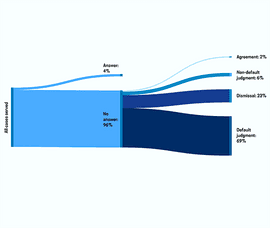
David McClendon and Divia Kallattil • August 19, 2024
Third-party debt collectors and debt buyers dominate Oregon’s civil courts, few Oregonians participate in debt cases against them
The Oregon Judicial Branch shared court docket data with January Advisors to analyze the scope of consumer debt lawsuits in the state. The analysis found the civil docket is dominated by specialized, high-volume filers suing individuals for credit card and medical debt. Only 4% of Oregonians who are sued participate in the case against them. As a result, most lawsuits end in default judgment, an automatic win for the plaintiff, which can have spiraling negative consequences for the person sued.
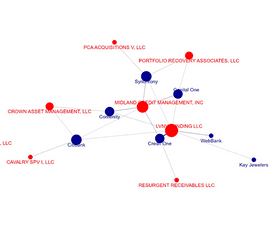
Abhay Aneja, Julia Byeon, Jacqueline Cope, Luis Faundez, Dalié Jiménez, Claire Johnson Raba, Prasad Krishnamurthy, and Manisha Padi • August 9, 2024
More Paper in Connecticut: An Evaluation of Documentation Reforms in State Court
This report examines the impact of Connecticut’s debt documentation reforms on debt collection litigation in state courtThe authors find that the reforms in superior court made a difference on several important outcomes, but also find widespread noncompliance with documentation requirements in small claims court. The report also contains recommendations to Connecticut courts.

Abhay Aneja, Dalié Jiménez, Claire Johnson Raba, Prasad Krishnamurthy, and Manisha Padi • July 15, 2024
More Paper in California: An Evaluation of Documentation Reforms in State Court
In the first of several research reports examining the effects of laws meant to increase the accuracy of debt collection judgments, researchers at the Debt Collection Lab along with professors at the University of California Berkeley School of Law report on the effect of a 2014 California law meant to do just that. They find that at least for a few years, the law reduced default judgments and delayed the time to obtain a judgment by 10 weeks when comparing lawsuits brought by third-party collectors versus those brought by original creditors.
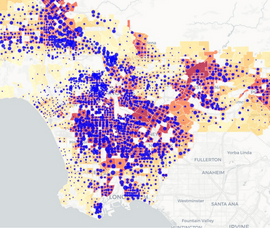
Claire Johnson Raba and Dalié Jiménez • June 1, 2024
California Debt Collection Lawsuits, Geography, Credit, and Race/Ethnicity: An Exploration
By combining debt collection lawsuit data with credit report and demographic information, researchers at the Debt Collection Lab are shedding light on the connection between financial distress and debt lawsuits. In a study of four counties in California, they find evidence of disparities across race and ethnicity. For example, Hispanic consumers are sued about a debt at more than twice the rate of their White neighbors, even though they have fewer delinquent accounts, fewer collections, and fewer bankruptcies than their White counterparts.
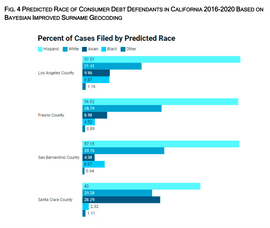
Claire Johnson Raba • July 31, 2023
The Unequal Burden of Debt Claims: Disparate Impact in California Debt Collection Cases
New findings from the Debt Collection Lab show that debt collection lawsuits are filed at higher rates against Black and Hispanic borrowers in California. Court data coupled with demographic predictions show disparities in engagement in the litigation process and more entries of judgment against non-white consumer defendants.
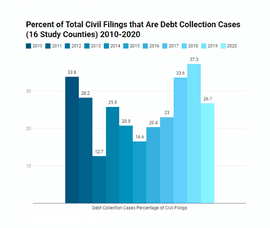
Claire Johnson Raba • July 24, 2023
One-Sided Litigation: Lessons from Civil Docket Data in California Debt Collection Lawsuits
A new report summarizes the impact of debt collection cases on California consumers. Repeat player debt collectors and their attorneys have a litigation advantage in this state where unrepresented consumer defendants rarely participate in the court process.
